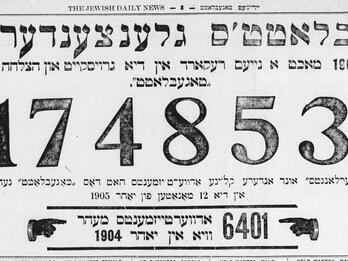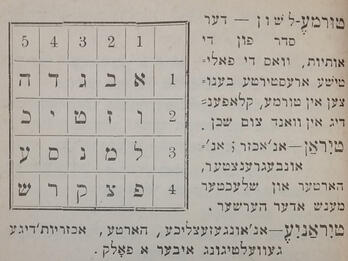The Quarrel between Hebrew and Yiddish
Woe be to me, in my old age,
That it should have to come to this:
That I stand in judgment here
With a shameless servant girl
And her vulgar band of friends.
No one knows me anymore!
Oh, hello; how do you do!
Grandma’s here, the aged dame,
With her pedigree and pride
From the cemetery’s soil,
Bringing sorrows, lamentations
And the woes of yesteryear!
Listen to my plea, Oh Judge,
Do not let the granny scream.
Let her cease to wail and groan:
No more curses, no more sighs.
Do not even let her bless!
Old complaints no longer work,
Time for life and freedom now,
Down with old and up with new!
Brothers, let us live our lives
Free from moldy calendars,
Free of psalms and prayerbooks too.
No more climbs to heaven’s gate
With clods of Zion’s holy soil,
No more peyes, no more beards,
(Cry the Yiddishists out loud).
Yes, away with all of that
With the tsitsis and prayer shawls
Away, away, away. . . .
Pity us, Oh Learned Judges,
It is shameful and disgraceful.
What the wench’s mouth has uttered
Are the words of utter baseness!
It is an unheard-of scandal
To defile an age-old language
As the Yiddish hussy does.
Consider the eternal voice
Of our poets and our seers
(Though they didn’t stoop to write
For such papers as the Fraynd
Or in the Veg or in the Tsayt.)1
All these men of great renown:
Our Isaiah, Jeremiah
Habbakuk and Zephaniah
Ezra, Daniel, Nehemiah
Zerubbabel ben Shaltiel,
Moses Mendelssohn and more,
Who are they—some plumber boys?
And Luzatto and ha-Levi2
Letteris and Krochmal,3 too
Witty Erter, Gordon’s verse4
Fuenn the maskil, Frishman too.5
(Even Peretz at one time!)
Bialik’s, Tshernikhovski’s verse
Aren’t doggerel, you know!
And even . . .
Yiddish [doesn’t let her finish her words]:
Just listen to how she’s all worked up,
Watch her as she pulls their strings,
Ibn Gabirol, Judah ha-Levi
All of them long passed away.
Gottlober6 and Gordon—stale,
All their lives upon this earth
They knew hunger, want, and cold,
Even lacked a pair of pants!
As for me and my great writers,
Nomberg, Asch, and Reyzen too,7
They are strong and some so young
They are bachelors as well!
Hotel Bristol is their home,8
They live well, with worldwide fame.
And the critic Bal-Makhshoves
Take him seriously, please!
Moses Syrkin, engineer,
And Yekhiel Vortsman, too,9
They are nobody to sneeze at,
They are men of sense and learning—
Doctor this and Doctor that.
Summing up, we must insist
That our literature means life!
Life, more life and joy as well!
Judge, upon my word, it’s shameful! [sighs bitterly]
Look, our Grandma’s caught a cough!
She will have to fast to cure it!
Ha-ha-ha!
[The curtain falls. The sobbing of Hebrew is heard, along with the ha-ha-ha of Yiddish.]
Translated by
.
Notes
[Der fraynd (The Friend, 1903–1912) was the first Yiddish daily published in the Russian Empire. Der veg (The Path, 1905–1907), was a Yiddish weekly edited by Noah Prilutski in Warsaw. Di tsayt was the first Yiddish daily published in the Lithuania region, in Vilna in 1906.—Eds.]
[Moses Ḥayim Luzzatto (1704–1746) and Judah ha-Levi (ca. 1075–1141).—Eds.]
[Meir Letteris (c. 1800–1871) and his teacher Naḥman Krochmal (1785–1840).—Eds.]
[Yitsḥak Erter (1791–1851) and Judah Leib Gordon (1831–1892).—Eds.]
[Shmuel Yosef Fuenn (1818–1890) and David Frishman (1859–1922).—Eds.]
[Avraham Ber Gottlober (1811–1899).—Eds.]
[Hersh Dovid Nomberg (1876–1927), Sholem Asch (1880–1957), and Avrom Reyzen (1876–1953).—Eds.]
[A luxury hotel in Warsaw that housed an opulent café popular among writers.—Eds.]
[Yeḥezkel Charles Vortsman (1878–1938), a Zionist journalist.—Eds.]
Credits
“Eliyahu,” “Sikhsekh tsvishn hebreish un zhargon” [Yiddish: The Quarrel between Hebrew and Yiddish], Di bin, no. 1 (Mar. 1906): pp. 6–7.
Published in: The Posen Library of Jewish Culture and Civilization, vol. 7.




